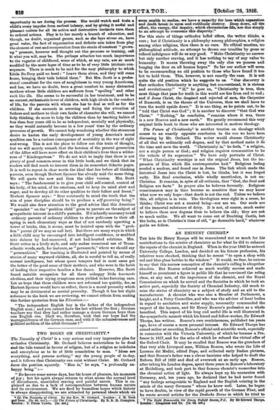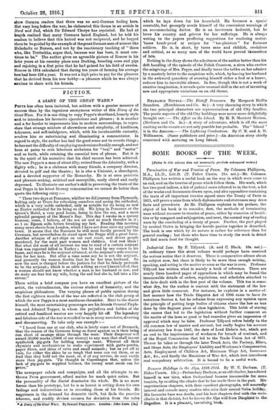AN EMINENT CHEMIST.*
Tax late Sir Henry Roscoe will be remembered not so much for his contributions to the science of chemistry as for what he did to enhance the repute of the chemist in England. When in the year 1848 he entered University College, London, and decided on his future profession, his relatives were chocked, thinking that he meant " to open a shop with rod and blue glass bottles in the window." It would, we fear, be untrue to say that this narrow conception of the chemist's calling is altogether obsolete. But Roscoe achieved so much worldly success and made himself so prominent a figure in public life that he convinced the ruling class, at any rate, of the importance of the chemist, and the Royal Commissions on which he served and the Societies in which he took an active part, especially the Society of Chemical Industry, did much to raise the status of chemistry as a subject of study and an aid to the manufacturer. A chemist who was also a Member of Parliament, a knight, and a Privy Councillor, and who was the adviser of local bodies in regard to sanitation and water supply, necessarily commanded the respect of the layman, and Sir Henry Roscoe's profession as a whole benefited. This aspect of his long and useful life is well illustrated in the sympathetic memoir whioh his friend and fellow-worker, Sir Edward Thorpe, has written. Roscoe's own reminiscences, published ten years ago, have of course a more personal interest. Sir Edward Thorpe has aimed rather at recording Roscoe's official and scientific work, especially in connexion with the Victoria University, of which he -became a Pro- fessor in 1857, and for the sake of which he refused the virtual offer of the Oxford Chair. It may be recalled that Roscoe was the grandson of that very able Liverpool man, William Roscoe, who wrote the Life of Lorenzo doi Medici, edited Pope, and collected early Italian pictures, and that Roscoe's father was a clever barrister who helped to draft the Reform Bill of 1832 and died of overwork at an early age. Roscoe, after taking his London degree, spent three years in Bunsen's laboratory at Heidelberg, and took part in that famous chemist's researches into the chemical action of light. He always kept up his -connexion with Germany, and, ten years ago, he declared that he had never found " any feelings antagonistic to England and the English existing in the minds of the many Germans " whom he knew well Later, he began to have doubts, in view of the rapid growth of the German Fleet, and he wrote several articles for the Deutsche Revue in which Ire tried to • The Right Honourable Sir Henry Enfield Roecoe,F.C. By Sir Edward Thorpe. london : Longman! and Co. 1711. ea. net] :thew. German. readers that there was no anti-German feeling, here. Not very long. bolero the war, he elaborated this theme-is., an article in Nord and Slid, which Sir Edward Thorpe has reprinted. He had at length realized that many Germans hated. England, but ba told his readers. to believe that this hatred was not reciprocal, and he begged them to be guided by the example of thegreat German men of 'science like Helmholtz or Bunsen, and not by the reactionary teaching of " those who, like Treitachke, argue -that, because war has been, it must con- tinua to be." The author gives an agreeable picture of Roscoe in his later years at his country place near Dorking, breeding cows and pigs and rejoicing in a first prize that he had gained for his field of swedes. Roscoe in 1914 calculated that during-ten years of farming his average loss had been f58 a year. It was not a high price to pay for the pleasure that he derived from his new hobby—a pleasure which he was always anxious to share with his friends.



































 Previous page
Previous page